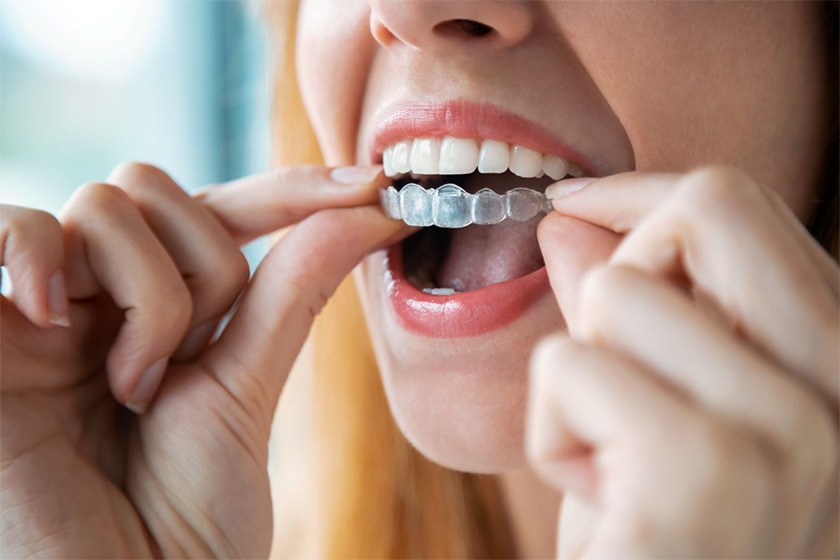Our oral health and the appearance of our teeth are important not only for functional reasons but also for our self-confidence and overall well-being. Damaged, decayed, or fractured teeth can significantly impact our ability to speak, eat, and smile comfortably. That’s where restorative dentistry comes into play. Specifically, dental crowns are a versatile and effective solution for addressing various dental issues, restoring both the aesthetics and functionality of damaged teeth.
Dental crowns are designed to replace the visible portion of a damaged tooth, acting as a “cap” to protect and reinforce the tooth’s structure. The dental crown process begins with a thorough examination and cleaning of the affected tooth, followed by reshaping the tooth to create an optimal surface for crown placement. Afterwards, a crown matching the size, shape, and color of your natural teeth is permanently cemented into place, restoring the tooth’s appearance and function.
Dental crowns can be made from various materials, including porcelain, ceramic, gold, and metal alloys. The choice of material will largely depend on the patient’s individual needs and preferences. Porcelain and ceramic crowns offer the advantage of closely resembling the appearance of the natural teeth, making them an excellent option for patients seeking a discreet and aesthetic restorative solution.
In this blog, we’ll take a closer look at the benefits of dental crowns, their various applications, and the process involved in this restorative dentistry treatment. Whether you’re dealing with a cracked, decayed, or severely discolored tooth, dental crowns offer a reliable and effective means of regaining your healthy, radiant smile.
Reviving Your Smile: The Versatility and Benefits of Dental Crowns
Applications of Dental Crowns: Restoring Form and Function
Dental crowns serve a variety of purposes as a restorative dentistry solution. Some common applications include:
- Repairing Damaged Teeth: Teeth that have experienced decay, fractures, or breaks can significantly benefit from dental crowns. The crown helps protect the weakened tooth from further damage while restoring its original shape and function.
- Root Canal Treatment: After a root canal therapy, the treated tooth is often left brittle, making it more susceptible to fractures. A dental crown restores the strength and integrity of the tooth, ensuring long-lasting protection.
- Dental Implants: When replacing a missing tooth with a dental implant, a dental crown is used to cover the implant abutment, serving as the visible, functional part of the artificial tooth.
- Aesthetic Improvements: Dental crowns can be an effective solution for masking discolored or misshapen teeth, enhancing the overall appearance of your smile.
Materials and Types: Choosing the Right Dental Crown
There are various types of dental crowns, each crafted from different materials to suit specific needs and preferences. Some common materials include:
- Porcelain: This material closely mimics the appearance of natural teeth and is often used for crowns on front teeth, where aesthetics are most critical. Porcelain crowns are known for their excellent color match, translucency, and stain resistance.
- Ceramic: Similar to porcelain, ceramic crowns offer excellent cosmetic results and closely resemble the natural teeth. They can be used throughout the mouth and are a popular choice due to their strength, durability, and natural appearance.
- Metal: Gold, and metal alloy crowns are long-lasting, highly durable options that can withstand significant chewing pressure. While less natural in appearance, they can be an appropriate choice for back teeth, where aesthetics might be less of a concern.
- Porcelain-Fused-to-Metal (PFM): These crowns combine the strength of metal with the natural appearance of porcelain. However, in certain cases of gum recession, the metal base of the crown may become visible, which can detract from their aesthetic appeal.
The Dental Crown Procedure: What to Expect
Once you and your dentist have decided on a dental crown as a restorative solution, the following steps are typically involved in the treatment process:
- Tooth Preparation: The first step involves numbing the tooth and surrounding area with local anesthesia. The dentist then reshapes the tooth to create an optimal surface for the crown placement.
- Dental Impression: A dental impression is taken to ensure a proper fit for your custom-made crown. This accurate mold of your tooth is sent to a dental laboratory where your crown will be crafted to match the size, shape, and color of your adjacent teeth.
- Temporary Crown Placement: A temporary crown is placed over your prepared tooth to protect it while the permanent crown is being fabricated. This temporary solution serves to preserve your tooth’s integrity and minimize sensitivity until the permanent crown is ready.
- Permanent Crown Placement: Once your custom-made crown is ready, the dentist will remove the temporary crown and carefully check the fit and appearance of the permanent one. After any necessary adjustments, the dentist will cement the dental crown in place, completing the procedure.
Caring for Your Dental Crown
Protecting your investment in your dental health is essential. Proper care of your dental crown can significantly enhance its longevity and ensure the continued health of the underlying tooth. Here are a few essential tips:
- Maintain Good Oral Hygiene: As with natural teeth, a dental crown requires proper cleaning to prevent the buildup of plaque and bacteria. Brush your teeth twice a day, floss daily, and consider using antimicrobial mouthwash to promote overall oral health.
- Visit Your Dentist Regularly: Routine dental checkups and cleanings are crucial in maintaining the health of your teeth and crowns. Your dentist will monitor the condition of your crown and address any potential issues early, ensuring long-lasting dental health.
- Avoid Damaging Habits: Chewing on hard items, such as ice, pen caps, or hard candy, can damage your dental crown. Additionally, reduce the risks by wearing a mouthguard during sports activities and using a nightguard if you grind your teeth during sleep.
Conclusion
Dental crowns are a versatile and effective solution for a variety of dental issues, providing both functional and aesthetic benefits to patients. At Lexington Smile Studio, Dr. Fawn Rosenberg and her skilled dental team are committed to delivering exceptional restorative dentistry services, helping patients achieve healthy, beautiful smiles.
Whether your dental needs involve a single dental crown or a comprehensive restorative plan, our dedicated team of dentists in Lexington will work closely with you to develop a personalized treatment plan tailored to your specific needs and goals. Don’t let damaged or decayed teeth hold you back. Contact Lexington Smile Studio today to schedule a consultation and take the first step towards the healthy, radiant smile you deserve.






